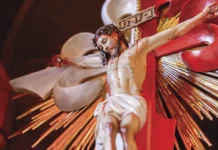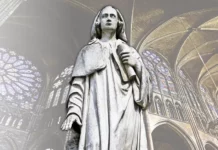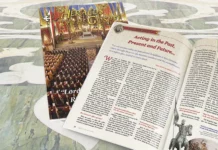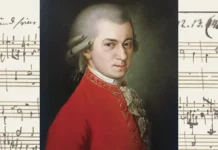In the struggle for sanctification, God reserves the most important part for himself, that is, His grace. But it is up to man to strive to cooperate with Him. The Almighty demands of us “courage, strength and faith.”
It was July 27, 1942. An elite unit of the French army was venturing onto the burning desert sands. Their target? A German air base in Egypt.
Amidst machine gun fire and the bombardment of the German Stukas, one of the soldiers was wounded in the shoulder and abdomen. They were serious injuries, as soon became evident from the profuse bleeding. His pallid face and almost colourless lips seemed to indicate that the brave soldier would not live much longer.
In fact, he died shortly afterwards, there, in the heart of the desert, in the midst of the war. Moments before surrendering his soul to God, he said to one of his companions, with the calm of one who knew how to fight and to confide in Providence: “I’m leaving you. Everything is in order within me.”
Because of the turmoil of the moment, his companions improvised a grave with stones they found there, topped by a cross made with two pieces of wood. And they carefully noted the coordinates of the place, so that they could later recover his mortal remains.
Before burying him, they searched his pockets and found a small notebook: simple, discreet and well-worn. Far greater than the material value of that object was its content. Among the writings contained therein, a prayer entitled La prière du para – The Paratrooper’s Prayer, composed by the deceased, would be a source of encouragement to those who dedicate their lives to great ideals.
It is a poetic cry from the depths of a heart chiselled by suffering and ablaze with the love of God. The person who composed it was aware of his bad inclinations, but he was committed to fighting them, and for this he implored “courage, strength and faith.”
Who was this paratrooper whose soul beseeched, with fiery words, that which is normally considered a motive for sadness, weariness and grief?
Yearning for the most arduous struggles

André Zirnheld was born in Paris on March 7, 1913. His family, of Jewish origin, came from Alsace, a region that for centuries had been accustomed to wars and territorial disputes with Germany. When he was only nine years old, death knocked on the door of his home, taking his father.
In October 1938, having graduated in Philosophy and completed his military service, he was sent to Syria to teach at the Collège de la Mission Laïque Française, as a military officer.1 And when, in 1939, the Second World War broke out, he was summoned to Lebanon to serve his country there.
The situation quickly escalated: the German Panzers advanced relentlessly towards Paris, forcing the French government to sign a humiliating surrender. With the armistice of June 22, 1940, a collaborationist regime was established which, under the direction of Marshal Pétain, obeyed the orders of the enemy government… For those who persisted in their intention to fight, no situation could have been more frustrating and discouraging.
André, however, did not surrender. He wanted to continue to defend his country, whatever the cost. He crosses the Lebanese border into Palestine, then under British control, and managed to join the French troops there, who had continued to fight.
He was initially assigned to work in the intelligence and propaganda service, but this was not to his liking. His desire was to fight where the battle was the most arduous and the risks the greatest. In 1942, he volunteered for the First Company of Paratroopers, known as the French Squadron.
What was going on in the soul of this soldier and philosopher, son of a bourgeois family, to make him so desire for the most arduous combat? Obviously, we do not know. But we can raise some hypotheses that can serve to help us to reflect on our own life.
Sanctity, struggle and the cross
There is something unique about skydiving. Without the security of a firm footing, in the absence of everything that constitutes stability for a human being, in the uncertainty of launching oneself into the air hundreds of metres above the ground and trusting only in one’s parachute, it is possible to experience the profound happiness of one who abandons himself into God’s hands.
André Zirnheld was fighting for his country. An interior élan urged him to take risks for love of what was superior to him. That is why he longed for danger and for what everyone rejects. He longed for “struggle and torment,” “uncertainty and trepidation.”

At some point, did complacency knock on the doors of this paratrooper’s soul, inviting him to flee from that life of constant upheaval which could lead to his death? Did it whisper in his ears, “counselling” to choose another calling that would be more secure and stable?
We can be sure that it did, because the deleterious winds of mediocrity never cease to blow strongly against those who tread the paths of heroism. Everything leads us to believe that André, like all men, felt within himself the two laws of which St. Paul speaks: that of the spirit and that of the flesh, which are constantly at war with one another (cf. Gal 5:17).
Struggle is part of the inheritance left by Adam to his children of all times: if one wants to be good, one must strive to be so! “The way of perfection passes by way of the Cross. There is no holiness without renunciation and spiritual battle” – the Catechism teaches us.2
In this fight for sanctification, God reserves for himself the most important part: His grace, without which we can do nothing. Nevertheless, He asks man to do everything within his power to cooperate with the divine plan.3
Now, the temptation to lead a mediocre and effortless life often presents itself to us. Called to live in harmony with heavenly goods and to practise virtue unto heroism, as true children of light, we are at such times attracted by the false tranquillity and illusory peace of a deleterious self-indulgence.
André Zirnheld’s most difficult battle
Whoever wishes to follow the path of sanctity must have the courage to defy the onslaughts of the devil, the world and the flesh; he must be determined to carry the cross; and above all he must seek to be inflamed with the enthusiasm and energy necessary to audaciously advance towards the desired goal, resolutely overcoming obstacles that oppose the divine Law.
No stranger to this struggle, perhaps the paratrooper André, while hovering in the sky, heedless of the risk, felt his soul being powerfully drawn to the worst vices and defects. He had the courage to launch himself from an aircraft to reach his target, it is true; he was accustomed to boldly facing the insecurity that skydiving entails, but perhaps he felt like a coward in fighting against his own defects.
Someone who, for the sake of an ideal, is capable of overcoming his own instinct of self-preservation is worthy of commendation and praise. But greater admiration is due to those who have conquered their own weaknesses and attachments in order to offer them up in holocaust before the throne of the Blessed Trinity: “The offering of a righteous man anoints the altar, and its pleasing odour rises before the Most High” (Sir 35:6).
The heroism of detachment
If André Zirnheld overcame his imperfections with the same bravery with which he accomplished his feats, the good truly won out within him. The prospect of death that war brings and the uncertainty of every leap are great educators. God uses them as a valuable instrument to stimulate in us the love of eternal life. Did our paratrooper make use of them to purify his soul and rise towards his Creator?
At a certain moment of the jump, in the immense silence of the heavens, he must have heard the gentle divine voice of Our Lord, causing new yearnings to spring up in his soul: “Mon Dieu, donnez-moi la tourmente, la souffrance, l’ardeur au combat! – Give me, my God, the torment, the suffering, the burning desire for combat!”
Urged by this grace, he must have conceived an even greater contempt for the vain pleasures of this world and learned to love pain, to reject the comfortable life, and to desire what no one had the courage to ask for: uncertainty, misfortune, unrest, struggle and torment.
The path of military heroism is thus enriched by the virtue of detachment. The route of risk, of suffering and of danger is elevated and transformed into a glorious way along which to scale an even higher peak: the heroism of detachment.
Daring as a soldier and daring in prayer

If the paratrooper was imbued with this spirit while carrying out dangerous missions, with the possibility of being shot by the enemy at any moment, the work of salvation would be wrought in him, between rifle shots and grenade explosions.
An analysis of events allows us to imagine that this was indeed the case.
On one occasion, for example, he jumped with four other men over an enemy airfield, managing to destroy six planes on the ground. And as he had already performed other military feats, such as destroying essential railway lines for the German army, he was decorated with the Croix de Guerre with two bronze palms.
Nevertheless, despite having received such honourable recognition, the ties that bound him to earth began to lose their value. His heart was beginning to forge bonds with God alone.
Seized by these yearnings, he wrote the famous poem that would come to be known as the Paratrooper’s Prayer, perfectly applicable to all who long to soar in the expanses of heroism. Holiness demands courage, strength and faith. It obliges one to fly, even if one’s feet do not leave the ground, and it invites one to constantly fight.
“He who dares, triumphs,” was the motto of Zirnheld’s squadron, and our paratrooper knew how to honour this maxim. He was daring as a soldier on earth and daring in the desires he raised to God in his famous prayer. Let us also be bold in all that concerns the glorification of the Most High. Let us stamp our objectives with courage, convinced that the necessary strength to achieve them will be given if we humbly implore divine help, by means of which we will be capable of feats unprecedented in history. ◊
The Paratrooper’s Prayer
Give me, O Lord my God, what Thou hast left, what no one asks of Thee. I do not ask for rest or tranquillity, neither of soul nor of body. I do not ask for wealth, nor success, nor health. So many ask this of Thee, O my God, that there must be nothing left for Thee to give. Give me, Lord, what Thou hast left; give me what everyone else rejects. I want insecurity and trepidation, I want struggle and torment. Give me this definitively, my God; give me the certainty that this will be my portion forever, because I will not always have the courage to ask Thee for it. Give me, Lord, what Thou hast left; give me what others do not want, but also give me courage, strength and faith.

Notes
1 An organization created in 1902 by Pierre Deschamps with the goal of spreading the French language and culture throughout the world.
2 CCC 2015.
3 Cf. ROYO MARIN, OP, Antonio. Teología de la perfección cristiana. 12.ed. Madrid: BAC, 2008, p.343.







